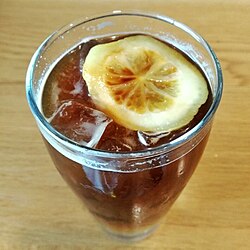Mazagran (drink)
 Mazagran | |
| Alternative names | Café mazagran Masagran |
|---|---|
| Type | Beverage |
| Place of origin | Algeria |
| Serving temperature | Hot or Cold |
| Main ingredients | Coffee, water |
Mazagran (also called café mazagran, formerly spelt masagran)[1] is a cold, sweetened coffee drink that originated in Algeria.[1] Portuguese versions may use espresso, lemon, mint and rum, and Austrian versions are served with an ice cube and include rum. Sometimes a fast version is achieved by pouring a previously sweetened espresso in a cup with ice cubes and a slice of lemon. Mazagran has been described as "the original iced coffee".[2]
History and origin
[edit]It has been stated that the drink's name probably originated from a fortress named Mazagran in a coastal town called Mostaganem in the northwest of Algeria[3] which in 1837 through the Treaty of Tafna was granted to France.[1] At the Mazagran fortress French colonial troops consumed the beverage, which was prepared with coffee syrup and cold water.[2] It has also been stated that the drink's name and invention may have originated from French Foreign Legion soldiers[4] who, during the time of the siege of Mazagran, Algeria during the 1840 war,[5] used water in their coffee in the absence of milk or brandy and drank the beverage cold to counter the heat.[4][6] Furthermore, French colonial troops near Mazagran were served a beverage prepared with coffee syrup and water.[1] When the soldiers returned to Paris, they suggested to cafés to serve the beverage and the notion of it being served in tall glasses.[1] Upon this introduction, the beverage was named café mazagran.[1] In France, coffee served in glasses is referred to as "mazagrin".[7]
Preparation and varieties
[edit]Mazagran is prepared with strong, hot coffee that is poured over ice, and it is typically served in a narrow, tall glass.[1][6][8] It has also been described as "coffee taken with water instead of milk", in which coffee is served in a tall glass along with a separate container of water to mix in with the coffee.[6]
The beverage has also been described as sweetened "Portuguese iced coffee" that is prepared with strong coffee or espresso served over ice with lemon.[9] Sometimes rum is added to Portuguese versions of the drink, and it may be sweetened with sugar syrup.[9]
In Austria, mazagran coffee is served with an ice cube and prepared with rum. The beverage is typically downed "in one gulp".[10]
In Catalonia and Valencia, it is made with coffee added to ice, and a lemon peel. It is called "Café del temps" (Cat.), "café del tiempo" (Spa.), or "weather's coffee".
In the mid-1990s, Starbucks and PepsiCo developed a line of flavoured carbonated mazagran beverages named "Mazagran" that were prepared with coffee.[4][11] After a short trial run in California in 1994, the drink was discontinued after failing to catch on with consumers.[4][11][12] A useful new by-product of Starbucks' research and development of mazagran was a coffee extract that could be used in various coffee-flavoured products.[11] The coffee extract was later used in the preparation of pre-mixed, bottled Starbucks' frappuccino drinks that are sold in grocery stores.[11] The extract is also used in the company's bottled double shot and iced coffee drinks.[12]
See also
[edit]- List of coffee drinks
- Mazagran – a type of drinkware usually used for coffee
References
[edit]- ^ a b c d e f g Ukers, William Harrison (1922). All About Coffee. Tea and Coffee Trade Journal Company. pp. 655–656.
- ^ a b Doctor, Vikram (April 20, 2012). "Coffee Song: A rethink on Coffee". The Economic Times. Archived from the original on November 2, 2014. Retrieved 2 November 2014.
- ^ New York State Library (January 1, 1850). Catalogue of the New York State Library. C. Van Benthuysen. p. 980.
- ^ a b c d Clark, Taylor (2007). Starbucked: A Double Tall Tale of Caffeine, Commerce, and Culture. Little, Brown. ISBN 978-0316026178.
- ^ Debry, Gérard (1994). Coffee and Health. John Libbey Eurotext. p. 32. ISBN 2742000372.
- ^ a b c Thurber, Francis Beatty (1881). Coffee, from Plantation to Cup (edition 6). American Grocer Publishing Association. p. 40.
- ^ Savage, F Walter (1878). French exercises, based on the Memory work of the French grammar. p. 119.
- ^ Louisiana. Dept. of Agriculture, Good Roads Institute (1900). Report, Volume 9. Louisiana. Dept. of Agriculture, Good Roads Institute, Shreveport, La. pp. 72–73.
- ^ a b DK (2014). Coffee Obsession. Penguin. p. 185. ISBN 978-1465434760.
- ^ Bousfield, Jonathan; Humphreys, Rob (2001). Austria. Rough Guides. pp. 46. ISBN 185828709X.
- ^ a b c d Bedbury, Scott (2003). A New Brand World. Penguin. pp. 72–73. ISBN 0142001902.
- ^ a b "Failed Starbucks drinks and products". Fox News. August 28, 2013. Archived from the original on August 28, 2013. Retrieved 2 November 2014.
Further reading
[edit]- Allison, Melissa (March 2, 2009). "Starbucks' instant coffee originated with the guy who brought us Frappuccino and a flop called Mazagran". The Seattle Times. Archived from the original on 2 November 2014. Retrieved 2 November 2014.
